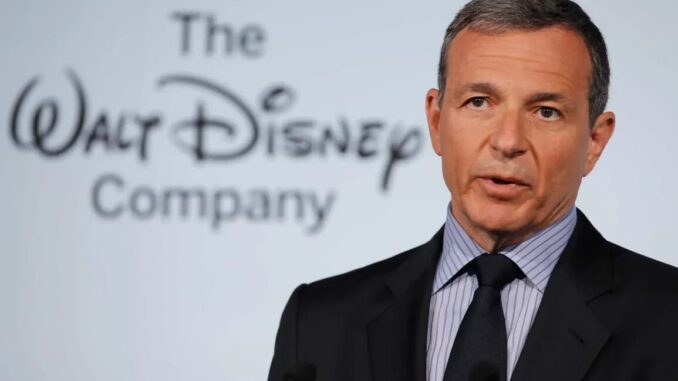
Disney has admitted that its recent shift towards far-left political and social ideologies has cost the company huge amounts of money.
In recent SEC filings, Disney acknowledges that becoming woke is costing the company and shareholders.

BYPASS THE CENSORS
Sign up to get unfiltered news delivered straight to your inbox.
You can unsubscribe any time. By subscribing you agree to our Terms of Use
Latest Video
Thehill.com reports: In its annual SEC report, Disney acknowledges that “we face risks relating to misalignment with public and consumer tastes and preferences for entertainment, travel and consumer products.” In an implied nod to Smith, the company observes that “the success of our businesses depends on our ability to consistently create compelling content,” and that “Generally, our revenues and profitability are adversely impacted when our entertainment offerings and products, as well as our methods to make our offerings and products available to consumers, do not achieve sufficient consumer acceptance. Further, consumers’ perceptions of our position on matters of public interest, including our efforts to achieve certain of our environmental and social goals, often differ widely and present risks to our reputation and brands.”
Disney and other companies have previously ignored consumer backlash over corporate campaigns such as Disney’s opposition to Florida’s Parental Rights in Education law. Corporate officials once avoided political controversies and focused on selling their products and services rather than viewpoints.
Disney has reportedly lost a billion dollars just on four of its recent “woke” movie flops, productions denounced by critics as pushing political agendas or storylines. Yet until now, the company has continued to roll out underperforming movies as revenue has dropped. What’s more, Disney stars persist in bad-mouthing its fabled storylines and undermining its new productions. The company admits that it has suffered a continued slide in “impressions” (that is, viewership) by 14 percent.
For shareholders, it may seem counterintuitive that corporate executives would trade off profits for political or social agendas. However, it does serve as a rationale for individual corporate executives who are professionally advanced when they champion such causes. For example, when Alissa Heinerscheid, vice president of marketing for Bud Light, pledged to drop Bud Light’s “fratty reputation and embrace inclusivity,” she was heralded by colleagues, even though her move went on to tank that brand as a whole. Indeed, Bud Light has still not recovered from the loss of billions in profits, market share, and overall market value.
The same trend is playing out in the media. Public trust in journalists has fallen to a record low. Yet media executives continue to push advocacy journalism, abandoning objectivity. As former New York Times writer Nikole Hannah-Jones declared, “all journalism is activism.”
With falling subscriptions and public backlash (this includes the amusing “Let’s go, Brandon!” mantra), the journalists continue to saw at the thin branch upon which they are sitting.
Again, while advocacy journalism is no more popular than woke corporate agendas, it remains “wealth-maximizing” for individual journalists, who can receive accolades from contemporaries by taking steps detrimental to their profession as a whole. For each individual, the falling revenues of their media outlets are outweighed by the individual advancement that comes with embracing advocacy over objectivity.
The same is true with academia, where universities and colleges are roundly criticized for their intolerance of opposing views and for purging faculties of conservative or libertarian professors. Roughly half of this country holds conservative or libertarian views. Yet faculty members have little incentive to put themselves at risk by demanding more intellectual diversity or viewpoint tolerance.
Each of these tales of decline represents a variation on another economic model called the “tragedy of the commons” whereby everyone makes personal decisions to their own immediate advantage that ultimately kill off the very resource that sustains everyone.
All of these corporate, journalistic and academic figures are acting for their immediate personal advantage at the expense of their companies and institutions.
In fairness to Disney, there is an expressive element to its products. Movies are artistic creations that emphasize certain motivations and values. At one time, those values included some that are now viewed as offensive, including racist tropes.
The question is the balance and degree of the political and social agenda. Disney’s products are now viewed by many conservatives as empty virtue signaling and endless attempts to indoctrinate children. Moreover, when the company publicly declares its opposition to a popular parental rights bill in Florida, it is moving away from a commercial to a political focus.
That is the problem with the invisible hand. You can bring movies to the public, but you cannot make them sell. Once an unassailable and uniting brand, Disney brand is now negatively associated with activism by a significant number of consumers. The company is now even reporting a decline in licensing revenue from products associated with Star Wars, Frozen, Toy Story and Mickey and Friends — iconic and once-unassailable corporate images.
The question is how long Disney (or its shareholders) can tolerate falling revenues tied to its “misalignment with the public.” It is a massive corporation and it can lose billions before facing any truly dire decisions. Yet even Disney’s CEO, Bob Iger, now appears to be seeking to “quiet things down” after years of culture wars.
Iger has come to accept that a company does indeed have to sell products to survive. As Smith wrote, “It is not from the benevolence of the Butcher, the Brewer or the Baker that we expect our dinner, but from their regard to their own interest.”


